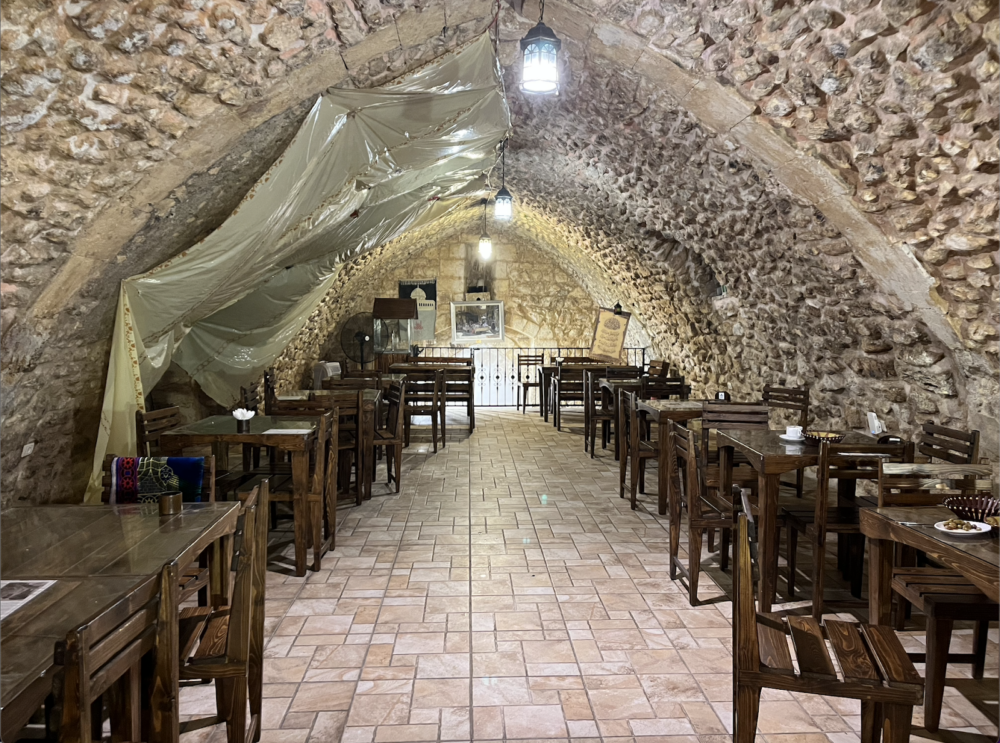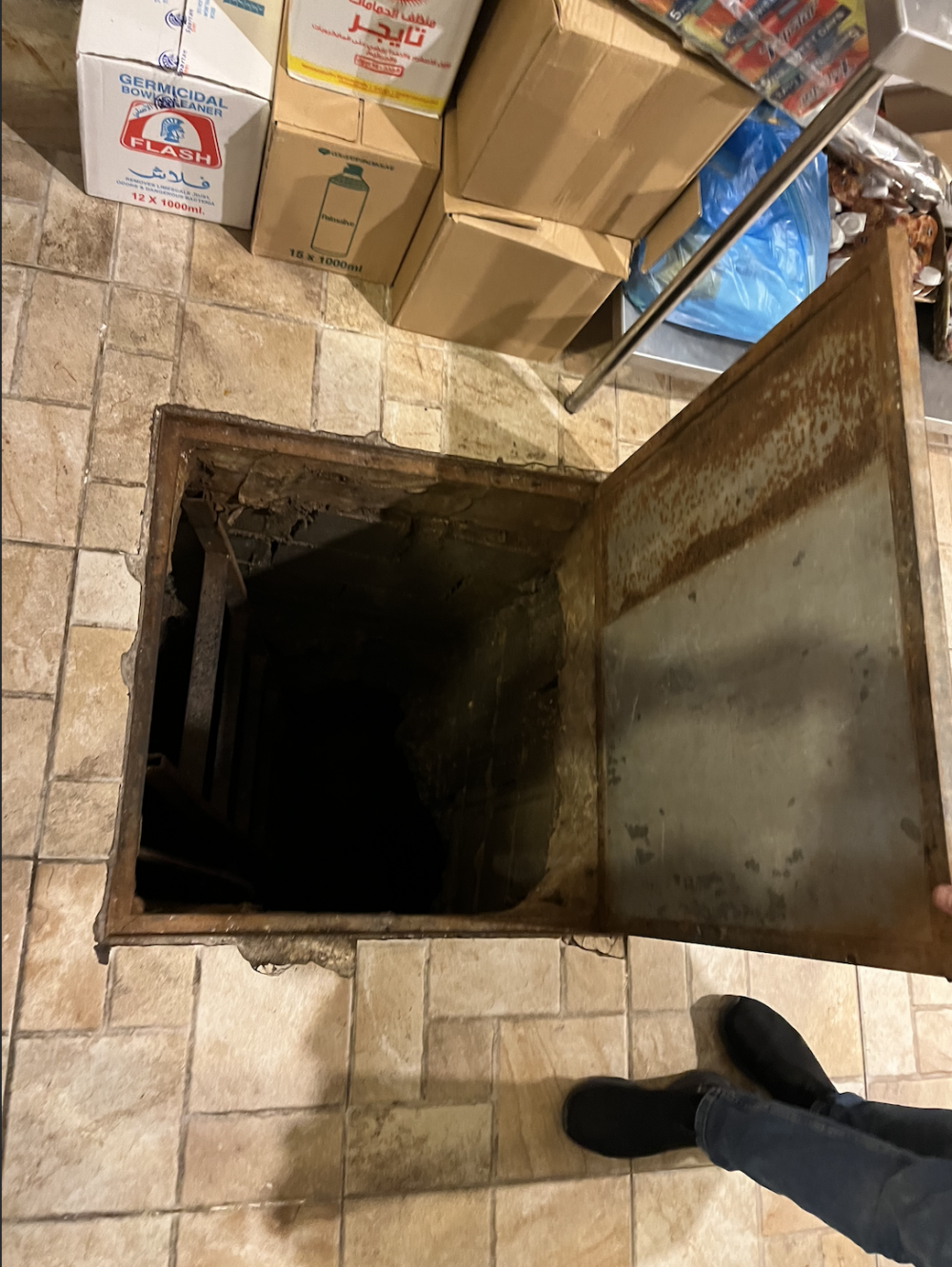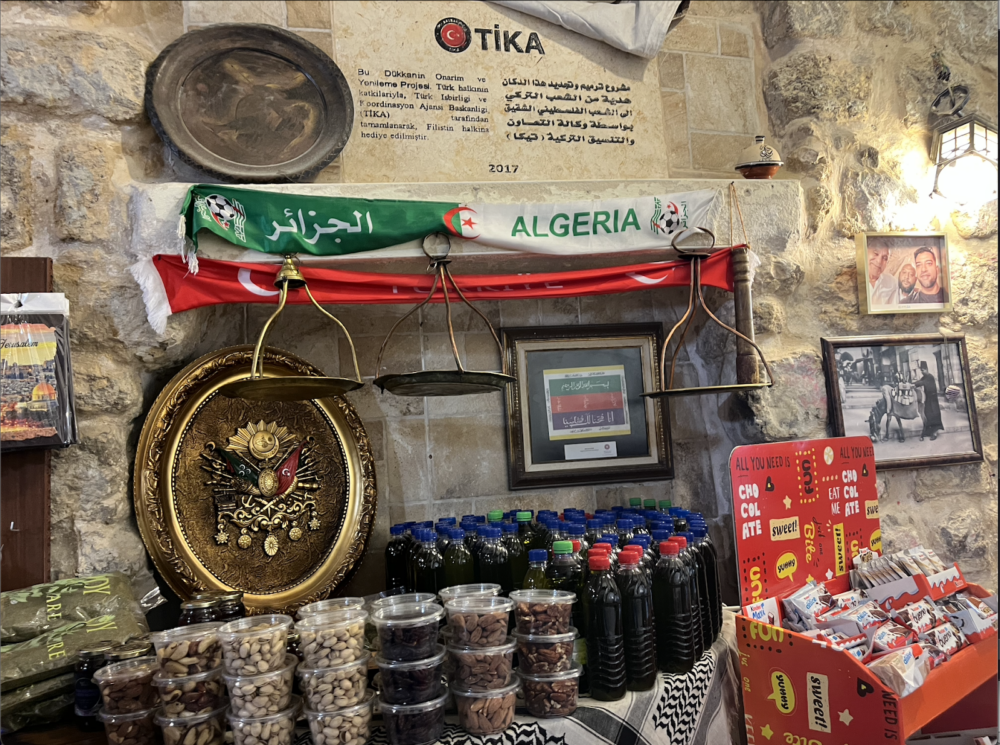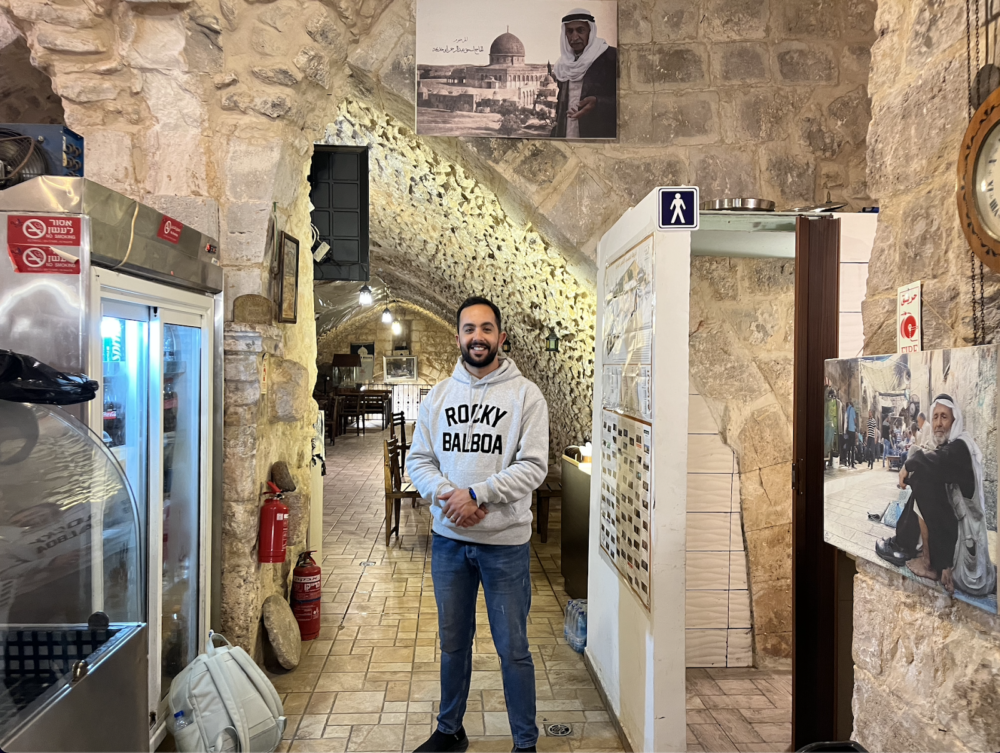
JERUSALEM — On a Wednesday in March, Emad Abu Khadija was preparing baklava, sahlab, and Turkish coffee for customers at his cafe in the Old City of Jerusalem when Israeli soldiers arrived. It was another sporadic check on the 1,000-year-old tunnels that exist beneath the Khan Abu Khadija Cafe, which reportedly lead to several of the city’s most holy, and heavily guarded, sites: The Dome of the Rock (Al Aqsa Mosque), the Church of the Holy Sepulcher, the Western Wall, and to Damascus Gate.
“The police come almost every week and check down there — they put signs on the walls and take photos to see if anything changed,” Abdullah Abu Khadijah said.
Khan Abu Khadija Cafe stands approximately 20 meters away— a less than five-minute-walk— from the Al Aqsa Compound, also referred to as the Temple Mount. For decades the Abu Khadija family has welcomed waves of locals, foreigners, pilgrims and tourists into their small clothing shop, and, eventually, cafe – and many have no idea a historic relic lies beneath them.
Khan Abu Khadija Cafe began as a small market where Emad’s father and grandfather cleaned clothes and sold some local goods. About 30 years ago, Emad began to expand his cafe, hoping to turn it into a larger restaurant. He labored for hours nearly every week with his younger sons, removing rubble, heavy rocks and dirt. It was during this expansion project that Emad first discovered ancient walls behind his family’s original shop.
In 2017, three years before Emad’s father died, he told his father that he heard “echoes or double-voices,” Emad said, but his father brushed off his concerns. Emad steadily continued to work toward his dream of converting the family cafe into a restaurant. He carefully broke down more of his shop’s gray and beige-brick walls, continued to manually remove rubble, and, eventually, began to level out the floors by shoveling deeper. In the back of his mind, he said, he continued to wonder what was causing the echoes. It wasn’t until Emad and his sons expanded through more layers of rocks and began the flooring process of his long-desired new space that he discovered an entryway into the ancient tunnel.
Archaeologists and historians believe this tunnel was formerly used as two roads during the Ayyubid Period in the late 12th century, according to local media reports. The tunnel itself is wide with Byzantine and Arabesque archways and passageways, but it is not passable because it is closed off by stones and rubble. In video recordings from Emad and videos taken by local Arab news outlets, seven closed-off underground pathways are visible.

In 2018, Emad Abu Khadija said, the Israeli government and the Israeli Antiquities Authority offered to buy the property from him for $24 million. He refused to make the sale. In 2022, they upped the price to $31 million and, most recently, a few months ago, to $40 million. Emad said that there’s no price high enough for the property.
“Even if they offered me hundreds of millions more, I would not sell,” Emad said.
According to the Israeli Antiquities Authority’s website, the agency is “responsible for all antiquities of the country, including underwater finds.” It adds: “It is authorized to excavate, preserve, conserve, and administrate antiquities when necessary.”
But Emad believes that the historic find beneath his restaurant should be protected and kept within the control of Palestinians. As a Muslim Palestinian, Emad said that this is part of his purpose in life — this is his “duty to the ummah,” the Muslim community.
Emad’s childhood and that of his sons took place within the confined walls of this property. “I have my family history inside this café,” he said.

The Khan Abu Khadija Cafe property has remained in the family for 93 years, according to Emad. He has memories of helping his father, Ishaq, and his grandfather, Abdulrahman, sell goods at the small market, and taking a less-than-10-minute walk to his home, which is also in the Muslim Quarter of Jerusalem.
“I was born right next to Al Aqsa Mosque,” Emad said. “Alhamdulillah,” he said.“Praise be to God.”
Emad remembers working hard as a child and as a young adult to help his family, taking breaks only during Islamic prayer times, he said.
Salim Tamari, a senior fellow in history and sociology at the Institute for Palestine Studies, said he has very rarely come across family shops existing inside or on top of ancient assets today. “The Israeli Antiquities Authority and archaeological journals on Jerusalem have already discovered so much over time,” Tamari said. “Jerusalem is built on layers —the archways and historic roads that many archaeologists find underneath the ground today signify Roman and Byzantine times, like what this cafe seems to have underneath it.”
Emad believes his discovery must “be a gift from God,” he said.
Throughout Emad’s expansion project, he has been arrested and fined for continuing construction inside his cafe. He has been heavily taxed. He has spent thousands of shekels trying to get the Israeli court system to approve of his application to expand and renovate his restaurant.
The average cost for a licensing restaurant application fee in the Old City is 500 shekels, Emad said, “but I have spent 17,000 shekels just in the last four years and until now the Israeli court hasn’t given me the license.”
Emad and his son Abdullah believe the constant delays, costs, fees, and arrests to all be a tactic by the Israeli government. “They are trying to take this place from us in any way,” Abdullah said. “We go to jail, we work, and we still pay the government — we are working, working, working, working, just to live another day.”
Some fundraising campaigns on Facebook, Instagram, and other social media platforms have taken place in support of Emad and his family over the years. One fundraising campaign created in 2016, titled “Save Emad’s Store Near Al-Aqsa,” raised nearly $1,500..
In an Arabic-language video posted for this fundraising campaign, Emad said, “My only wish is to preserve ancient Islamic art in this modern time. My dream is to open a restaurant that serves the Al Aqsa Mosque and the poor,” he continued.
These videos and social media posts attracted many viewers from around the world, Emad said, including more tourists and pilgrims who visited his cafe after hearing about this news. The Turkish Cooperation and Coordination Agency, a government organization that provides foreign aid to more than 150 countries, including the Palestinian territories, was especially moved by the news circulating about Emad Abu Khadija.
The Turkish agency “helps a lot of people here in the Old City,” Abdullah said of the Turkish agency “They said to us: ‘Just keep your cafe and we will help you.’” Anytime the Abu Khadija family does construction work, they must notify Israeli authorities, who monitor them to prevent damage to any of the ancient findings. This costs Emad 1,600 shekels for every construction project in his cafe — a cost covered by the Turkish agency.

While the total monetary aid to the Khan Abu Khadija Cafe remains unclear, the Turkish agency continues to send volunteers, pays the Israelis for monitoring construction, has covered costs of renovation in the cafe, and raises awareness about the Abu Khadija’s efforts to keep this property within the family and to help realize Emad’s dream to open a restaurant.
Serdar Cam, the president of the Turkish agency, said to the Daily Sabah, a Turkish publication, they not only contribute to the restoration work for Palestinian communities, but they also “provide development aid for Palestinians, such as development employment, vocational courses, projects in the field of health and the strengthening of educational opportunities by opening schools.”
During the Islamic holy month of Ramadan, the Khan Abu Khadija Cafe is open for 24 hours. Volunteers from around the world, especially from Turkey, aid the family and help prepare meals to donate to locals. The only times Emad said he sits down is when his family and friends break their fasts together right after praying Maghrib in Al Aqsa Mosque, and then again during suhoor, the Muslim pre-dawn meal, before the sunrise (Fajr) prayer.
Family memories, traditions, and history, like these during Ramadan, continue to fuel their decision to not accept the recent offers for their café.

“‘I spent all of my life, 90 years here, but I can’t make it,” Abdullah’s grandfather, Ishaq, told him in Arabic a few months before his passing. “Now your father will take care of it and you must after your father. We must keep it generation after generation.”
